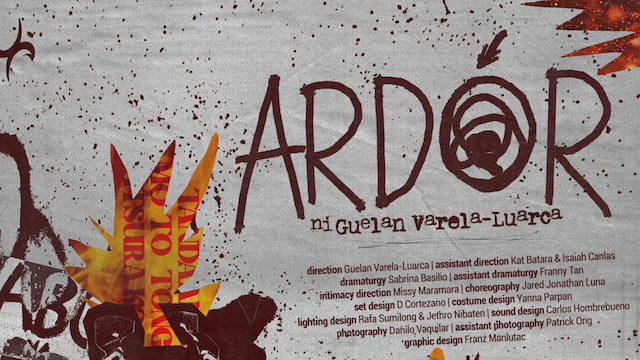
UNI REVIEW: Tanghalang Ateneo’s ‘Ardór’
One would expect university theater organizations to hold back—to be given less latitude to express controversial or disruptive ideas, given that their names are tied to their respective schools. But Tanghalang Ateneo’s new production, Ardór, is a reminder that theater is also constantly developing in exciting and audacious ways from the university stage. By having younger people interpret challenging material in an educational setting, plays like this feel subversive in the most productive sense, and act as a challenge for professional theater companies to get even bolder.
Set in a dystopian Manila in the near-future, Ardór follows a group of student activists who are embroiled in conflicts against government forces, when they become involved with a seemingly psychic “indigo child” who preaches total anarchy and chaos. The show’s attempt to mirror this disorder in its own storytelling can be as rough as it is inspired, but the result is still a uniquely thrilling narrative for the stage with an unforgettable central character.
Tense, Empty Spaces
The world of Ardór is represented by the hollowest of sets: bare concrete walls and several stray columns—against which the violence of the outside world is occasionally projected through stark lights (by Jethro Nibaten and Luis Antonio Rafael A. Sumilong) and the overwhelming noise of the ensemble running from police or debating amongst themselves (sound designed by Carlos Hombrebueno). There’s a real feeling of foreboding in how empty these spaces feel, although the lack of distinct visual detail also makes it harder to understand the conditions that have shaped these characters, and what it is they’re fighting for, exactly. It’s clear that the play means to speak to a universal, all-consuming hopelessness and dread, but this also means it doesn’t engage with specific, relevant points in our history in particularly compelling ways.
Ardór fluctuates between extended scenes of strikingly calm, sometimes wordless action, and tense, frantic sequences frequently involving the entire cast. But while the actual movement between these two tones can lead to more whiplash than intended, Guelan Varela-Luarca’s direction remains fiercely confrontational. Whether we’re watching two lovers with differing ideologies sharing a quiet moment in bed, or a group of rebels setting a building ablaze (with the use of real, slightly dangerous fire effects), Varela-Luarca just lets things play out without moralizing things for us—daring us to face the tension between all these opposing views.
Balancing Opposing Views
Varela-Luarca’s ability to present every perspective with equal weight is ultimately what makes the production so bold. Whether his characters advocate for a hopeful and constructive attitude towards revolution, or a morally flexible ethos of survival, or a total rejection of all order and hierarchy, he emphasizes how all these points of view are borne from courage and desperation. Ardór’s dialogue would come off as didactic if it wasn’t so rousing and so full of human imperfection. When the indigo child, Kali (played alternately by Cholo Ledesma and Teia Contreras), proclaims that no ideology is the only ideology worth following—itself a contradictory statement—those listening respond with fear, confusion, and bloodthirsty zeal. And you can’t blame them; at the end of the day, these are all imperfect human beings trying to figure out the best way to achieve an impossible ideal.
So while the show’s plotting can occasionally feel aimless—particularly in the first act, when we’re introduced to Kali and their older cousin, Z (Yani Lopez and Zoë de Ocampo), in oddly episodic scenes—it builds and builds with breathless anticipation, eventually cohering into a suspenseful story of not just revolution, but of young people trying to save each other in an already damned world. The more that Z loses control over Kali and grows apart from the movement itself, the more they believe that love can fix things—again, a sentiment both naïve and idealistic.
Monumental Performance
As Z, Yani Lopez easily stands out as the anchor of earnest emotion amid so much disorder, especially during scenes where the show’s expressive ensemble fills the stage with all their controlled chaos. The passion that Z is meant to feel for fellow activist Astrid (Camille Banawa, alternating with Jam Binay), however, doesn’t quite come through—possibly a deliberate choice to signal their political differences, but noticeable all the same. Still, what Ardór really hinges on is its portrayal of Kali: a character meant to be childlike, impossibly charismatic, and terrifying all at once—and it’s a role that Cholo Ledesma is just monumental in.
Eerily convincing as a precocious child possessed by the spirit of anarchy itself, Ledesma at first seems like an anomaly in Ardór’s grim world, before becoming a completely commanding presence, with monologues pitched somewhere between academic lectures and divine homilies. So imposing is this character and this performance that you feel Ledesma’s absence when he’s not on stage, but you’re constantly aware of the shadow that Kali casts over every other character. No matter which political ideology you resonate with throughout the play, it’s this character’s complete disillusionment with humanity that comes off as Ardór’s most disruptive—and most painfully honest—truth.


Comments